Bac Sum Pass: Discover Ha Giang’s Stunning Mountain Road
Renowned for its narrow roads, breathtaking scenery, and cultural diversity, Bac Sum Pass is a hypnotic mountain pass in Ha Giang province. This pass provides the ideal mix of environment, thrills, and local knowledge for anyone looking for an amazing journey in Northern Vietnam. Let MOTOGO Tours explore.
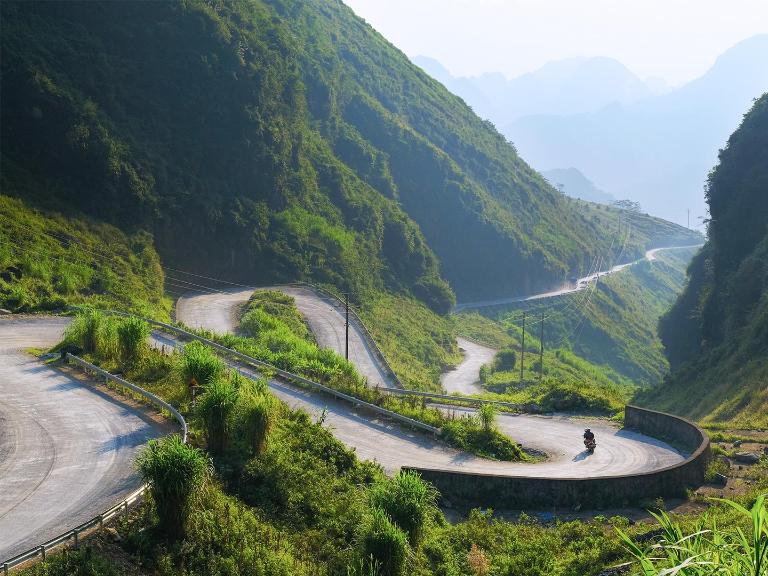
An Overview of Bac Sum Pass in Ha Giang
Reputed as the longest and most difficult mountain pass in Ha Giang, Bac Sum Pass National Highway 4C winds this meandering path over Minh Tan commune (in Vi Xuyen District) and Quyet Tien commune (in Quan Ba District). Linking many well-known tourist sites in Ha Giang, the pass is essential between the two districts.
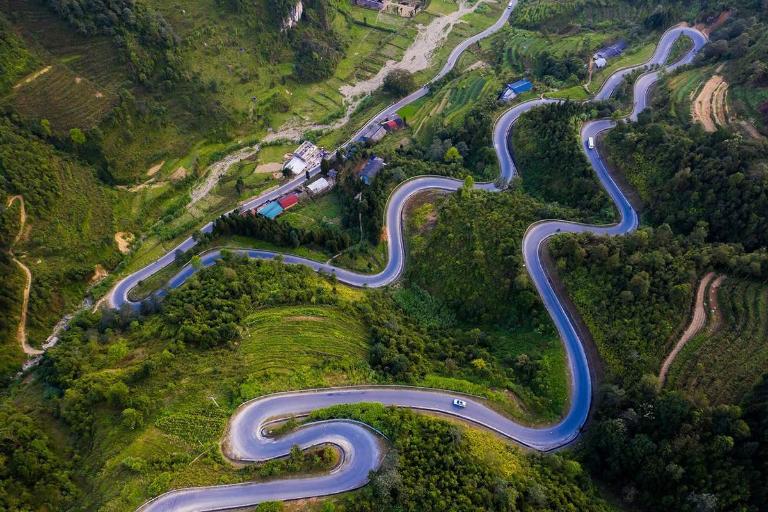
Many abrupt curves define Bac Sum Pass and create a ‘M’ form from above. Locals sometimes liken the bends down the mountainside to a big serpent crawling down the hill. For many adventure lovers, Bac Sum Pass is a must-conquer challenge with an elevation of around 450 meters and a length more than 7 kilometres.
For the Vietnamese people, this location has historical importance since it was so important during their fight against the French colonial troops. For soldiers and local militias in the northeastern alpine areas, Bac Sum Pass was a vital communication channel during the resistance period. The pass made a major difference in the triumphs throughout the struggle for French colonial control.
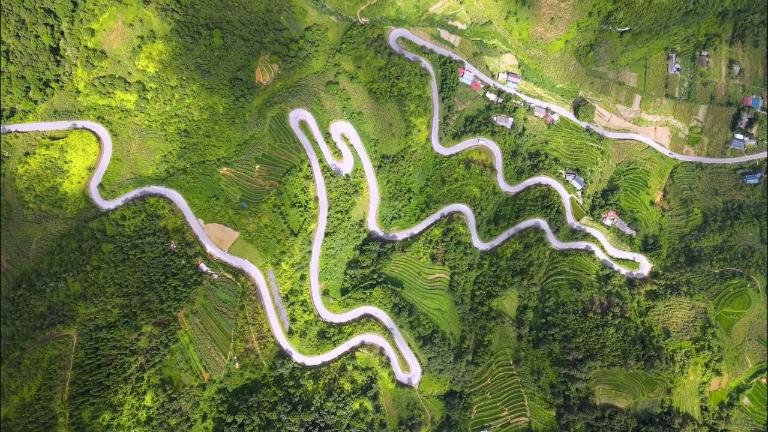
These days, Bac Sum Pass has not only made it easier for people to get between districts and towns in the area but also spurred local businesses. The pass is crucial in promoting economic development over Ha Giang’s hilly regions by improving the transit of products and encouraging trade between nearby towns.
How to Get to Bac Sum Pass
Your starting point will determine the path of access to Bac Sum Pass. For both local and foreign visitors, among these the paths from Hanoi to Ha Giang and from Ha Giang city centre to the pass are the most often used ones.
Traveling from Hanoi to Ha Giang
From Hanoi to Ha Giang, you could decide on a motorbike, car, or sleeper bus among several ways of mobility. Depending on your taste, every choice provides different advantages ideal for your trip approach. Many passengers choose the sleeper bus since the journey between Hanoi and Ha Giang is about three hundred km.

Operating Hanoi to Ha Giang bus services, multiple transportation companies running various kinds of buses—sleeper, VIP room, limousine, etc. These buses have private cabins or reclining beds as well as basic conveniences to let travellers have a pleasant rest while travel.
The services and bus quality influence the ticket prices. A sleeper bus from Hanoi to Ha Giang currently runs 250,000 to 450,000 VND. Among respected bus companies with reasonable rates are Bang Phan, Cau Me, Cong Phuong, and Manh Ha.
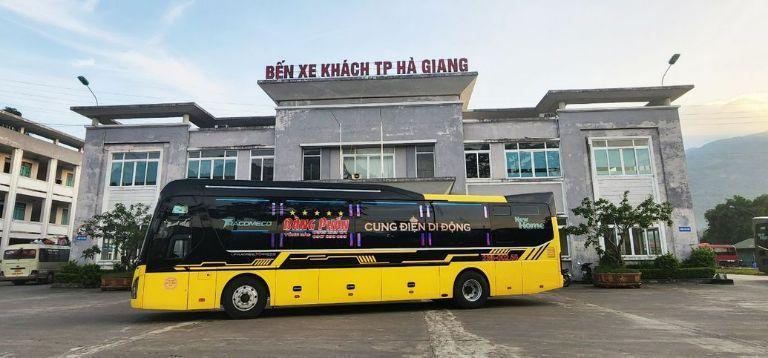
For younger visitors driven by adventure, renting a motorbike in Hanoi is a preferred choice instead. Here are two advised paths if you would want this kind of travel:
- Route 1: From Hanoi city center – Thang Long Avenue – QL21 – QL32 – Trung Ha Bridge – Phu Tho Town – National Highway 2 – Tuyen Quang City – Viet Quang Town – Ha Giang.
- Route 2: From Hanoi city center – Nhat Tan Bridge – Vo Chi Cong – Vinh Ngoc – Vo Nguyen Giap – QL2A – Phuc Yen Town – Vinh Yen City – QL2C – Tuyen Quang City – Viet Quang Town – Ha Giang.
Traveling from Ha Giang City Center to Bac Sum Pass
About 32 kilometres north of Ha Giang city centre sits Bac Sum Pass. Usually using National Highway 4C, the path to this site is rather simple. The usual travel time from the city centre to the pass is about 46 minutes. This is a proposed path:
Head directly into Nguyen Trai Street (National Highway 2) from the heart of Ha Giang city. You will come to a roundabout after roughly three kilometres; exit onto National Highway 4C. After another 29 kilometres on this highway, you will reach Bac Sum Pass.
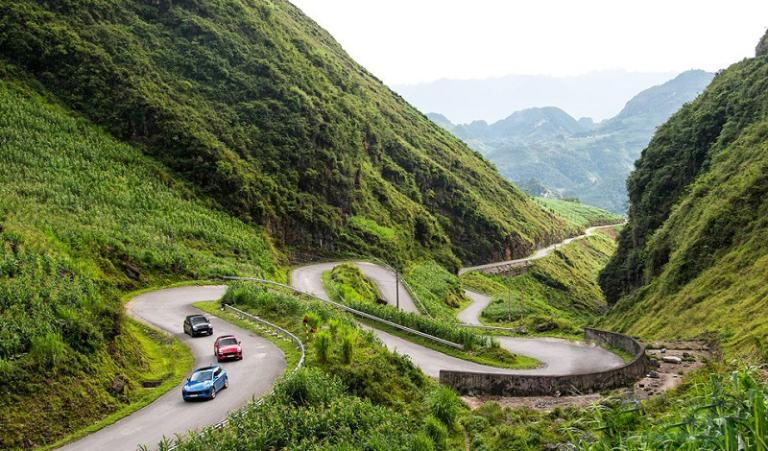
One can use a car or a motorbike to go to the pass. Driving might save you time if your only goals are sightseeing and picture taking at Bac Sum Pass. Riding a motorbike, however, is highly advised if you want to completely explore and conquer the pass so you may enjoy the beautiful scenery and pure mountain air.
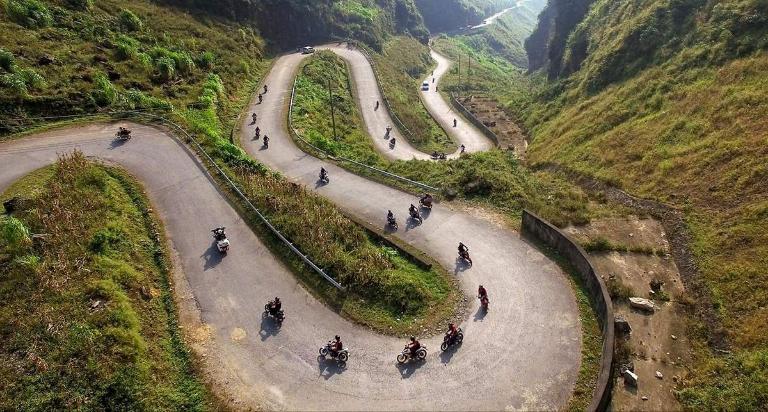
Selecting a trustworthy motorbike rental company will help you to have a safe and comfortable travel to Bac Sum Pass. Popular among many travellers, MOTOGO is a suggested alternative with fair costs, great customer service, and premium motorbikes. Besides, you can choose MOTOGO guided trips like Ha Giang Loop Tours to improve your experience. They will give a whole picture of the background and importance of Bac Sum Pass.
The Best Time to Visit Bac Sum Pass
Ha Giang boasts year-round stunning landscape, and Bac Sum Pass is no exception; every season has a special appeal that enthrals guests. To guide your choice of the best time to visit Bac Sum Pass, let’s investigate its unique beauty in every season.
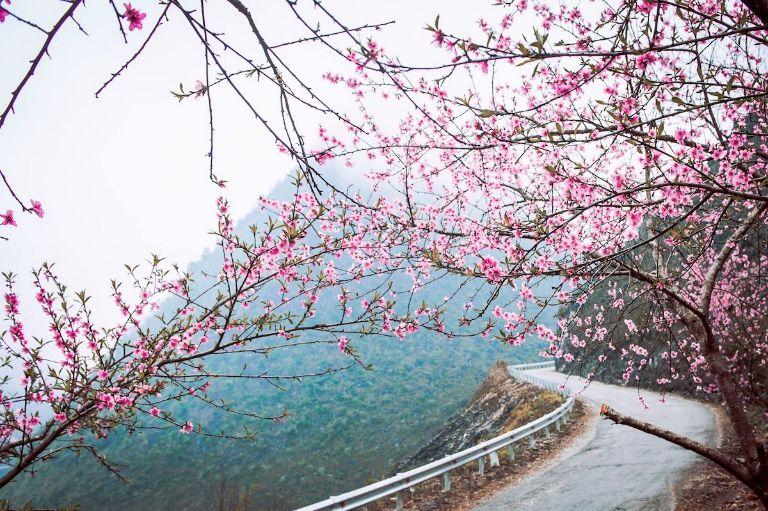
Travellers will be captivated by the pink blossoms of peach flowers and the white blossoms of plum flowers in spring—February through April. The flowers seem to be fighting for attention along the mountain slopes, giving welcome the spring vivid colours. Nobody should miss this kind of experience.
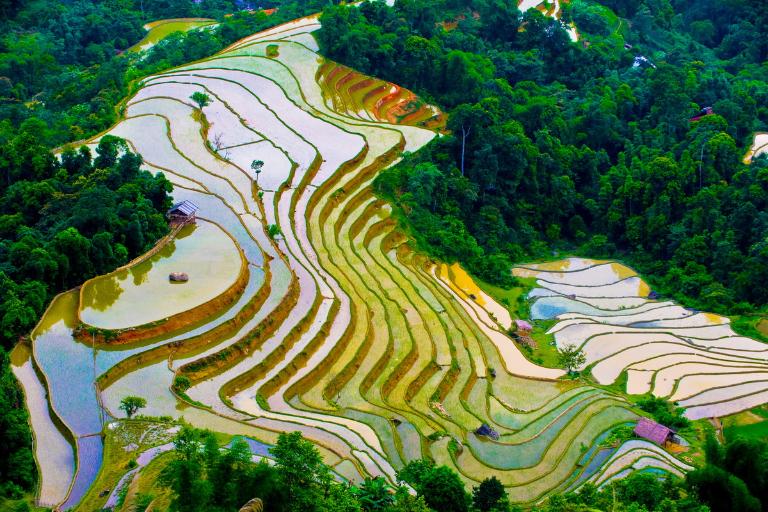
Like other northern provinces, Ha Giang enters its “water pouring season” early summer (May to June), during which water is drawn in readiness for the new rice crop. Teraced pastures with shimmering water surfaces reflecting the sunlight and producing a magnificent image along Bac Sum Pass.

Visiting Bac Sum is best done in autumn, between September and November. The terraced fields are blanketed in golden rice while early October is when the people get ready to pick the summer rice crop. Ha Giang’s well-known buckwheat blossoms start to bloom towards the end of fall, giving the scene a romantic touch.
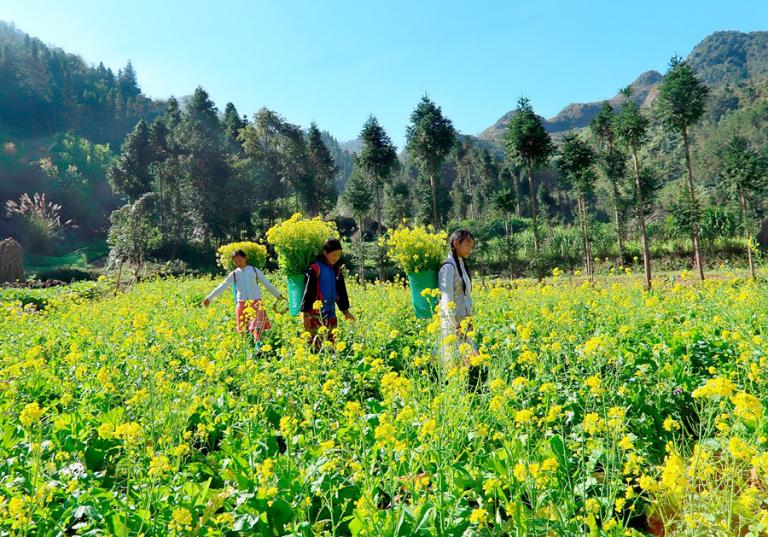
Visiting Bac Sum in winter (December to January) lets you see the straightforward but lyrical beauty of the yellow mustard blossoms fully bloom. Ha Giang’s cool climate during this season causes the mustard flowers to blossom for one to one and half months before dying. Visitors will therefore have many chances to get breathtaking pictures with these blooms.
>>> Let’s see more: When is the Best Time to Visit Ha Giang? Discover the Ideal Seasons
Things Not to Miss at Bac Sum Pass
The Nine-Bend Pass (Dốc Chín Khoanh)
Nine severe hairpin turns and U-shaped curves define the portion of Bac Sum Pass known as Dốc Chín Khoanh. With steep and difficult twists, the pass is poised dangerously along the mountainside. Every ambitious tourist dreams of completing this difficult path formed by the nine interconnecting bends.
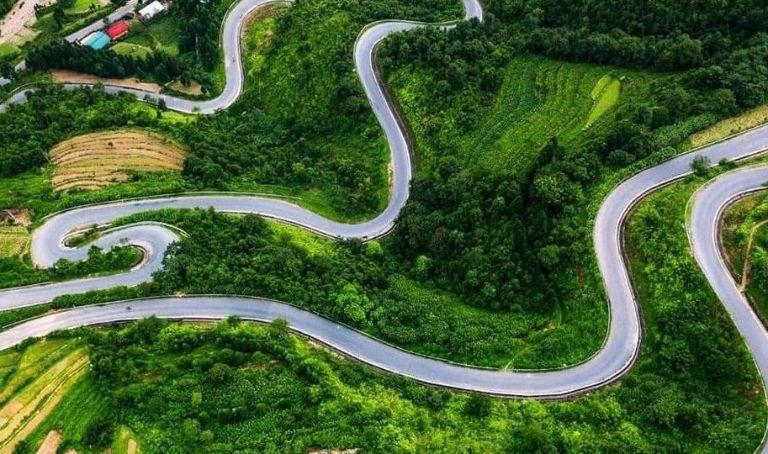
Dốc Chín Khoanh is regarded as a test for cars, however the Tham Ma Pass in Ha Giang is well-known for challenging horse endurance. Not all kinds of cars can negotiate this difficult crossing given its steep hills and lots of abrupt turns. Many motorcycle clubs have found challenges negotiating Dốc Chín Khoanh.
Here there is also a local perspective connected with love. Couples that make it across the whole Nine-Bend Pass together are reported to have gone through challenges and will have a lifetime happy relationship. The pass, which represents a monument to their love, has thus become a favourite spot for couples to get wedding pictures.
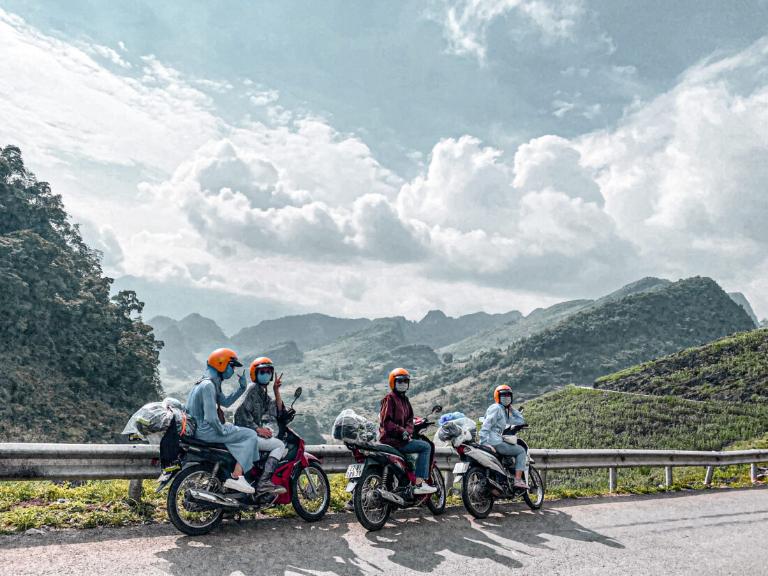
Once the nine bends are over, stop to appreciate the beautiful natural surroundings and the meandering paths you just passed. From this vantage point, the whole village of Sung La is tucked away in the valley below—a quiet, unspoiled community radiating a frontier tranquilly.
The “Check in Bac Sum Pass” Stopover
Take a pause and visit the “Check in Bac Sum Pass” halt if the difficult path across Dốc Chín Khoanh has tired you. About 500 meters past the Nine-Bend Pass, situated on National Highway 4C, sits this rest spot. Covering more than 3,000 square meters, the “Check in Bac Sum Pass” complex has a café, restaurant, and photography space.
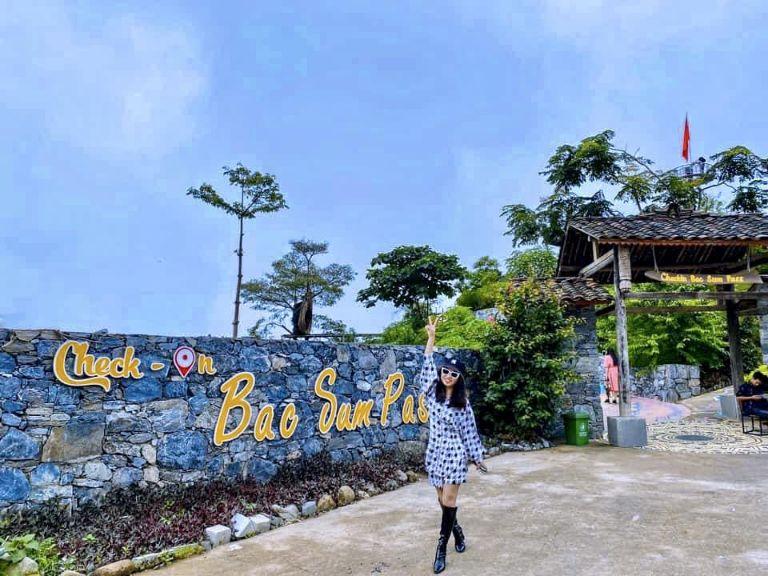
Particularly well-liked in the picture area are a “Heaven’s Gate,” a Buddha’s hand sculpture, and a “Stairway to Heaven.” Visitors with a modest 35,000 VND entrance fee can snap as many pictures as they desire. “Check in Bac Sum Pass” also provides traditional costumes for hire, thereby highlighting the ethnic groups’ cultural attire—Hmong, Dao, Tay, Nung, and San Diu.
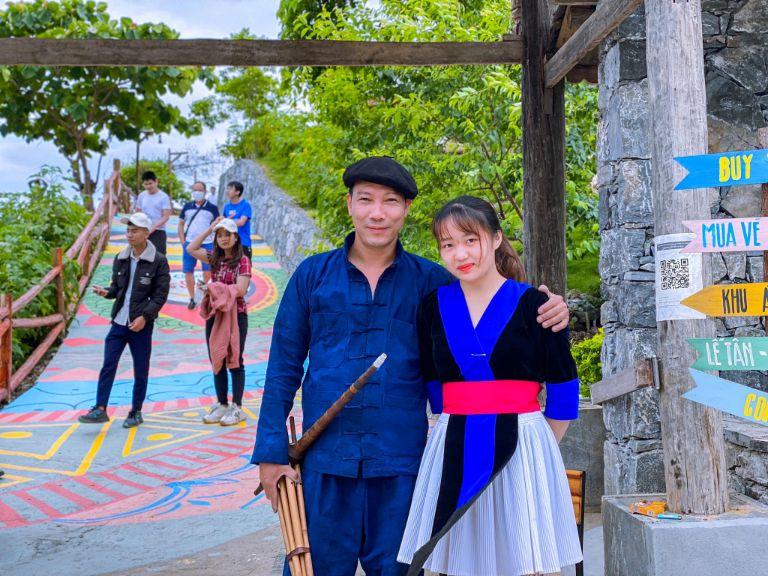
Among the Ha Giang specialities the restaurant offers are smoked buffalo meat, “cắp nách” pork, “thắng cố” (a Vietnamese hotpot), and five-colored sticky rice. Every dish on the menu has obviously stated pricing, therefore guaranteeing that clients are not overcharged.
Nearby Attractions to Explore
Starting point for investigating some of Ha Giang’s most amazing locations is Bac Sum. Worth seeing are the nearby natural beauties, historical sites, and unusual geological formations.
Quan Ba Twin Mountains
A few kilometres from Bac Sum Pass, the Quan Ba Twin Mountains—also known as the “Fairy Bosom—are an amazing natural creation with an interesting past. With verdant valleys, terraced farmland, and little towns, the Quan Ba Twin Mountains’ surrounds also captivate. From Quan Ba Heaven Gate, tourists may enjoy the area from a panoramic perspective where the hills encircle the verdant countryside tapestry.
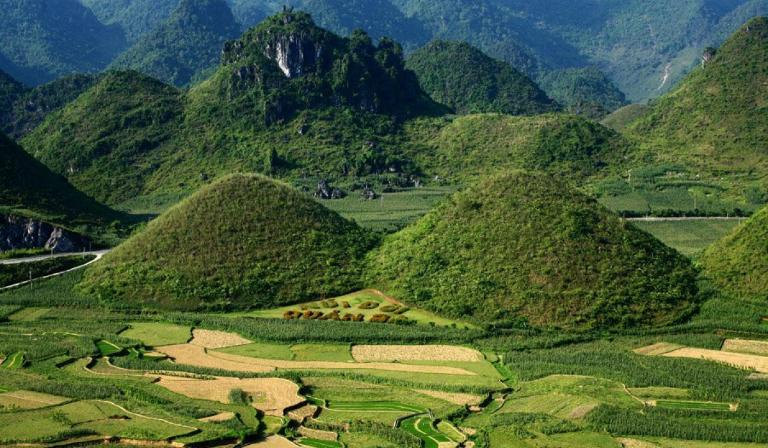
>>> Explore Pao’s House: A Place Reflecting the Beauty of Hmong Culture
Lung Khuy Cave
Lung Khuy Cave, close to Quan Ba town, is among Ha Giang’s most exquisite cavernues. Over thousands of years, amazing stalactites and stalagmites have developed to produce complex patterns and structures. Over three hundred meters make up the cave, and illuminated walkways lead guests over its captivating depths. For those interested in geology and natural history, each chamber unveils unique natural sculptures ranging from animals to people to mythological beings.
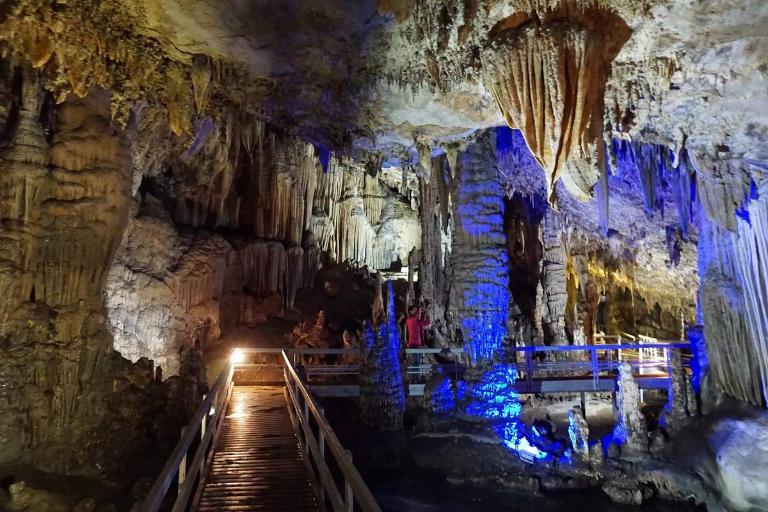
Bac Sum Pass invites exploration of one of Vietnam’s most beautiful areas, not only a mountain road. Every visitor should include this place on their list since of its adventurous attitude, cultural diversity, and spectacular scenery. Whether your ride is a motorbike, trail walk, Bac Sum Pass guarantees an experience as gratifying as it is unforgettable.
Related Posts:
- Experience Suoi Thau Grassland: The Untamed Beauty of Ha Giang
- Lo Lo Chai Village: A Tranquil Retreat at the Nation’s Frontier
- Nam Dam Village: A Timeless Haven of Cultural Harmony
- Lung Tao Village: A Must-Visit Destination for Buckwheat Flower Viewing
- Lung Tam Village in Ha Giang | A Deep Dive into the Village’s Traditional Linen Weaving Craft









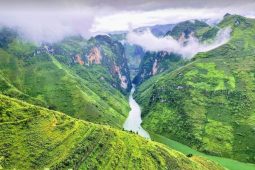
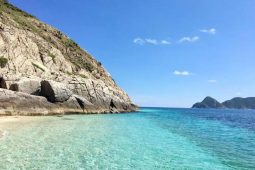
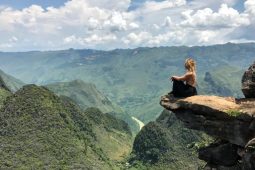
Be the first to comment!